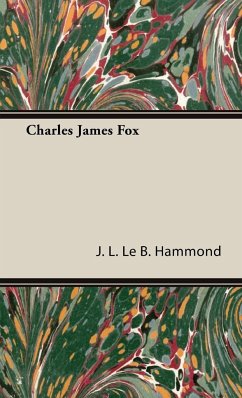CHARLES JAMES FOX A POLITICAL STUDY by J. L. Le B. HAMMOND. CONTENTS: FOX AND THE KING The internal weakness of the Government due to Shelburnes position. Rockinghams death. Resignation of Burke and Fox as a protest against the Kings influence in the Cabinet. The Coalition. The motives that prompted it. The real issue the Kings authority. The Kings control of Pitt in vital issues throughout his career. Fox right in his aims but wrong in his tactics. The public bewildered and suspicious. The Coalition Government and the India Bill. The great debacle of March 1784. Foxs account of his motives in 1796. Demoralising effect of the struggle alike on Pitt and on the Rockinghams. PARLIAMENTARY REFORM Pitt drops Reform after one effort in Parliament in 1785. Difference between Pitts view and Foxs view of Reform. Fox on the strength of Democracy. The Reform Agitation suspended. Public opinion listless. The Opposition disqualified by its heterogeneous character. With the Revolution public interest revives and a compact Opposition emerges from the quarrel between Fox and Burke. Greys two Motions in 1793 and 1797 The difference between Fox and the Democrats. Fox against universal suffrage because it would enfranchise men who were not independent. His conception of citizenship. Was Reform urgent ? The decay of the Yeoman class in England at the end of the eighteenth century. THE REIGN OF TERROR Comparison of the Agitation of 179394 with that of 1780. A different social class, but methods the same. The Government case destroyed by the great trials of 1794. Lord Roseberys justification. The Prosecutions in England and Scotland. The Coercion Bills of 1795. The Suspension of the Habeas Corpus Act. The hard lot of the Reformers. Coleridges letter on Thelwall. The efforts of the Opposition in Parliament. Attempts to promote agitation in the country. Fox retires in 1797. His speech at the Whig Club on the Sovereignty of the People. His name removed from the Privy Council, Characteristics of his speeches against the Coercion coo. FOX AND IRELAND I The rise of the national spirit in the seventies. Grattans work. The Volunteer movement. The great triumph of 1782. Foxs attitude. His argument that no country was entitled to hold the sovereignty of another against its will. Proposal for commercial treaty declined by Grattan. The unfortunate agitation of 178283 over the reality of the concession of independence. Its results. The question settled by explicit Act of the British Parliament. The armed Convention of Volunteers. Fox firm against concession to men in arms. The Convention disperses. FOX AND IRELAND II The importance of the Election of 1784 to Ireland, The delicate situation created by the arrangements of 1782 illustrated in the Regency crisis. Pitts great commercial scheme. Foxs acrimonious opposition. The scheme drops. The keynote to Pitts Irish policy his dread of an independent Ireland. Hence his resistance to reform and his flagrant increase of corruption. Concessions to Catholics in 1792 and 1793 designed to avert more formidable danger of Parliamentary Reform.
Hinweis: Dieser Artikel kann nur an eine deutsche Lieferadresse ausgeliefert werden.
Hinweis: Dieser Artikel kann nur an eine deutsche Lieferadresse ausgeliefert werden.






![The Letter Of ... Charles James Fox To The Electors Of Westminster, Dated January 23rd [really 26th] 1793, With An Application Of Its Principles To Subsequent Events By R. Adair The Letter Of ... Charles James Fox To The Electors Of Westminster, Dated January 23rd [really 26th] 1793, With An Application Of Its Principles To Subsequent Events By R. Adair](https://bilder.buecher.de/produkte/64/64823/64823447m.jpg)

